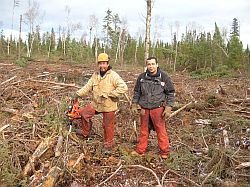 Establishing a relationship with a First Nation community doesn't have to be onerous or time-consuming. When Augen Gold Corp. executives picked up the phone and called the Mattagami First Nation, everything proceeded like clockwork.
Establishing a relationship with a First Nation community doesn't have to be onerous or time-consuming. When Augen Gold Corp. executives picked up the phone and called the Mattagami First Nation, everything proceeded like clockwork.
The Wabun Tribal Council, an umbrella organization for Mattagami and six other First Nation communities across northeastern Ontario, has negotiated agreements with "six or seven" mining companies and has it down to a science.
Chris McKay, a Mattagami First Nation member who provides consulting services to the tribal council, made it easy for Augen Gold by tabling a draft agreement and offering to negotiate on behalf of the three First Nations whose traditional territories fall within the company's Southern Swayze Project halfway between Sudbury and Timmins. Two or three meetings was all it took to conclude an MOU.
Instead of the mining company "running around and not knowing who to talk to," McKay offered to negotiate one agreement on behalf of the Mattagami, Brunswick House and Flying Post First Nations.
"We've done our homework and built a good reputation," said McKay. "The mining industry is small. People know each other and word gets around.
"Things like Platinex (a mining company that was prevented from accessing its property in northwestern Ontario) put fear into everyone, but we have a different perspective. We're close to the city of Timmins, a city that was built on gold, so we say, embrace it."
McKay applauds Augen Gold for initiating contact with the Mattagami First Nation before beginning its exploration program in late 2007.
"Some companies haven't figured it out yet. We experienced that right from the beginning with one of the companies we were dealing with. They said, ‘We don't need you. You don't have veto power over us' until it came down to us having to exercise our rights on certain things that forced them to the table."
It's got to be a win-win proposition, insists McKay.
"We don't want to put anyone out of business, and that's the fear...that there's going to be revenue sharing, that we're going to take a percentage. They don't look at it from a social side. They look at it from the business side. It has been a couple years now and some of our partners are very happy with how we can support them."
Having a positive relationship with nearby First Nation communities offers mining and exploration companies a number of advantages, including access to labour, training dollars and mining services.
According to McKay, a good relationship with First Nation communities can also speed up the permitting process.
Ore hauling
The tribal council is currently working with another mining company to develop a joint venture ore-hauling business."We can save them money," said McKay. "There's none of this jacking up rates because we're an Aboriginal community. We have to be competitive. Our partner is a mining company and we have to make sure they're profitable. We don't win if we're not competitive."
The memorandum of understanding agreed to by the parties commits Augen Gold to equal opportunity hiring practices, said Chris Marmont, the company's vice-president of exploration.
"Last year, we had two people from Mattagami working pretty well all year from January through to November. They were measuring core, splitting core, bagging it and sending it off to labs. They also did magnetic susceptibility readings on the core. This past summer, we moved on to some more prospecting and got them involved in that."
The agreement also obliges Augen Gold to fund a liaison person, "but the operation isn't big enough to make it a full-time position, so one of the First Nation people who works with us does that," said Marmont.
Environmental concerns also came up in discussions. For example, the First Nations questioned Augen Gold about its plans to drill through the ice on Lake Opeepeesway, but were satisfied when the company assured them that they had a competent drilling contractor doing the work and that all of the necessary precautions were being taken to protect the environment from any contamination.
"It's just a case of being straight-forward and upfront, having mutual trust and mutual respect," said Marmont.
"They were pleased that we came to them very early. Sometimes, they find a company is working in their backyard and they hear about it fourth hand. When you do that, you give the impression that you've gone behind their backs. If you're in the picture from day one, it makes it a lot easier."
With several members of the Mattagami First Nation working for Augen Gold and other mining and exploration companies in the region, the impact is easy to see, said McKay.
"My neighbour never had a truck before. Now he has a truck. He has a full-time job and he's getting bonus pay. The kids are in hockey. Four, five years ago, they couldn't afford skates for their kids."
www.augengold.ca
www.wabun.on.ca
Best practices
- Be straight-forward and upfront
- Make the approach as early as possible
- Keep the First Nation in the loop
- Use existing agreements as a model
- Establish a First Nation partnership to streamline negotiations
- Take a win-win approach
- Understand the mining company's need to be competitive

